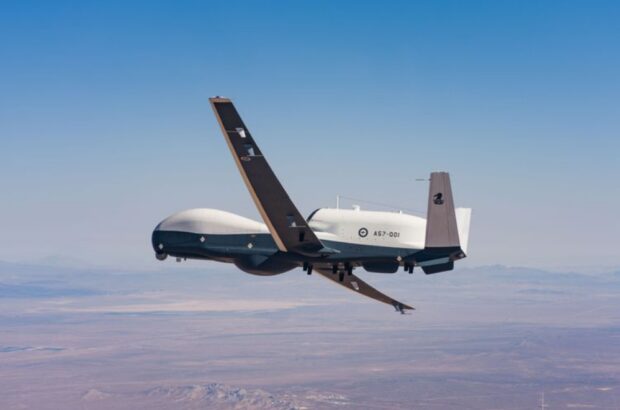successfully completed the first flight of Australia’s multi-intelligence MQ-4C Triton uncrewed aircraft on Thursday, November 9 at its Palmdale Aircraft Integration Center in California. The flight marks a major production milestone as Northrop Grumman progresses toward delivery of Australia’s first Triton in 2024.
- Built for the U.S. Navy and Royal Australian Air Force, the multi-intelligence MQ-4C Triton is the only uncrewed, high-altitude, long-endurance aircraft performing persistent maritime intelligence, surveillance, reconnaissance and targeting.
- The first flight occurred at 11:56 a.m. PST with total flight time of approximately 6 hours and 24 minutes. Airworthiness evaluations, such as engine, flight control and fuel system checks, and basic aircraft handling tests were conducted.
In September, the Australian government announced the addition of a fourth aircraft that will enhance the resilience of their fleet and provide superior surveillance capability to monitor and protect Australia’s maritime interests 24/7.
Christine Zeitz, chief executive and general manager Australia & New Zealand, Northrop Grumman:
“We are leveraging our deep expertise in uncrewed high-altitude long endurance aircraft to enable Australia to establish a superior long range maritime surveillance capability to monitor and protect Australia’s maritime interests 24/7.”
Air Marshal Robert Chipman, Chief of the Royal Australian Air Force:
“Triton expands Australia’s intelligence, surveillance and reconnaissance capability by providing reliable real-time intelligence and situational awareness. Persistent surveillance enables better planning, greatly enhancing joint military responses and operations.”
Details on Program:
The multi-intelligence MQ-4C Triton uncrewed aerial system achieved a declaration of initial operating capability (IOC) by the U.S. Navy on Aug. 3, 2023.
Australia’s role in the Triton cooperative program was critical to shaping its system requirements. Together, U.S. and Australian defense forces will be able to share data collected by their respective Tritons, a critical ability in one of the world’s most strategically important regions.
Australia’s security challenges run the spectrum of humanitarian and disaster relief to maritime monitoring of the vital sea lanes in the Indo-Pacific. With all four Australian Tritons currently under contract progressing as planned through their production schedules, the systems will have a vital role to play with sensors and communication nodes that can facilitate the transfer of data across warfighting domains and various mission needs.
Source: Press Release

